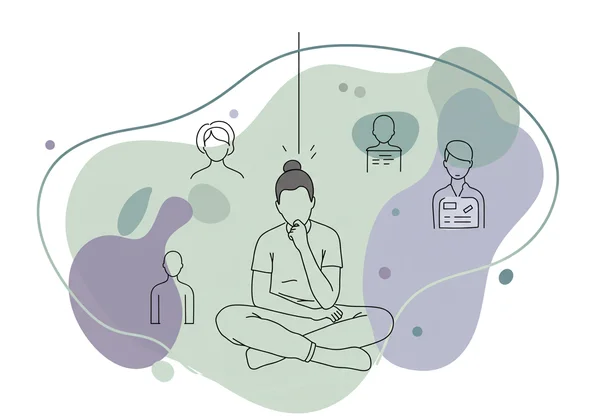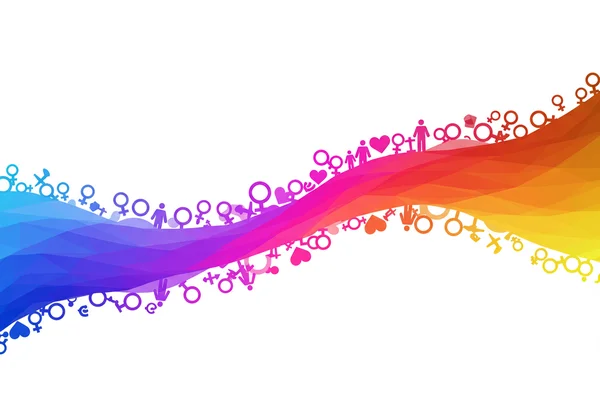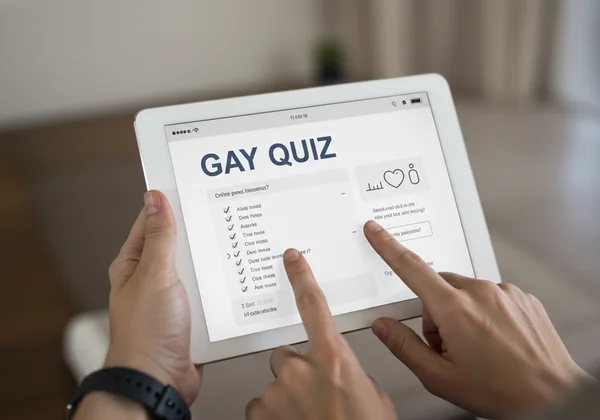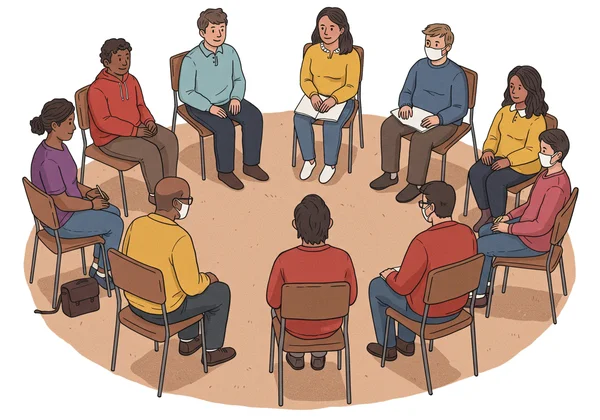Is Questioning Your Sexuality Normal? Take a Gay Quiz to Explore Identity
July 21, 2025 | By Isla Dawson
Have you ever found yourself wondering about your attractions or feelings? If you're grappling with questioning your sexuality, it's important to hear this first: you are not alone, and your feelings are valid. Many people ask themselves, "Is it normal to question my sexuality?" The answer is a resounding yes. This guide is here to offer reassurance, explain why this is a healthy part of self-discovery, and show you how taking a private gay quiz can help you explore your identity further.
This journey of introspection is a courageous step toward understanding your authentic self. It's a path of personal growth that can lead to greater self-acceptance and happiness. We're here to walk alongside you, offering insights and a safe environment for your exploration.
Why Questioning Your Sexuality is Completely Normal
The idea that everyone has a fixed, clear-cut sexuality from birth is a common misconception. In reality, identity is fluid and can evolve. To question your sexuality is normal because it's an intrinsic part of understanding who you are as a person. It's a sign of self-awareness and curiosity, not confusion or something being wrong.
Think of it as exploring any other part of your identity, like your career path, your beliefs, or your passions. It’s a journey, not a destination, and it’s unique to you. Accepting this allows you to approach your feelings with kindness and patience, free from judgment.

The Universal Journey of Identity Exploration
From a young age, we are on a continuous path of identity exploration. We learn about our personality, our talents, and our place in the world. Questioning our sexuality is a natural extension of this universal human experience. It is not confined to a specific age or group; people from all walks of life find themselves reflecting on their attractions at different points in their lives.
This process is about aligning your inner feelings with your outer life. It is an active search for authenticity. Recognizing this as a normal developmental stage can remove a great deal of pressure and anxiety, allowing for genuine self-discovery.
Common Feelings When You're Questioning
When you begin this journey, you might experience a mix of emotions. You could feel curious, excited, anxious, or even overwhelmed—and it's all okay. These feelings are part of the process of self-reflection. Many people report feeling a sense of relief when they finally allow themselves to ask these important questions.
You might be exploring new attractions or re-evaluating past experiences through a new lens. Remember that this exploration is for you and you alone. There's no timeline or deadline. An am I gay quiz can sometimes be a gentle starting point to organize these thoughts in a private, non-judgmental way.
Debunking Myths About Sexual Identity
Unfortunately, there are many myths surrounding sexual identity that can make questioning feel more difficult. A common myth is that sexuality is a binary choice—either straight or gay. This is simply not true. Another is the idea that once you identify a certain way, it's set in stone forever.
The truth is that identity can be fluid, and your feelings can change over time. It's also vital to understand that attraction is complex; it’s not just about who you want to have a physical relationship with, but also who you are emotionally and romantically drawn to.
Understanding Your Unique Sexuality Journey
Your path to understanding yourself is unlike anyone else's. Your sexuality journey is shaped by your experiences, your feelings, and your personal reflections. Embracing this uniqueness is the key to a fulfilling exploration. There is no right or wrong way to feel, and every step you take toward self-understanding is a victory.
Tools and resources can act as helpful guides along the way. They provide a framework for your thoughts and can introduce you to new concepts that help articulate what you're feeling. A well-designed sexuality quiz can be a fantastic first step in this personal discovery process.
Sexual Orientation is a Spectrum
One of the most liberating concepts in understanding sexuality is that sexual orientation exists on a spectrum. It's not just a set of rigid boxes. Beyond gay and straight, there are many identities, including bisexual (attraction to more than one gender), pansexual (attraction regardless of gender), and asexual (experiencing little to no sexual attraction), among others.
Understanding this spectrum can help you see that your feelings don't have to fit neatly into one category. It gives you the freedom to identify in a way that feels most authentic to you. An LGBTQ quiz can be an interesting way to learn more about where you might fall on this beautiful and diverse spectrum.

Recognizing the Signs of Self-Exploration
How to know if I'm gay? This is a question many people type into search engines. The signs of self-exploration are often subtle. They might include daydreaming about relationships with different genders, feeling a stronger emotional connection with people of the same gender, or simply feeling that the "straight" label doesn't quite fit.
It's also about differentiating types of attraction. You can feel a romantic attraction (wanting to be in a romantic relationship) that is different from your sexual attraction (who you desire physically). Allowing yourself to explore your identity means paying attention to all these nuances without pressure.
The Role of Quizzes and Tools in Your Exploration
In a world that can feel noisy and judgmental, finding a safe, private space to think is invaluable. This is where tools like an online gay quiz can be incredibly helpful. These quizzes are not meant to give you a definitive diagnosis or label you. Instead, their purpose is to provide a structured way for you to engage in self-reflection.
By answering questions about your feelings and attractions, you can start to see patterns and gain insights you may not have noticed before. The best gay quiz tools are designed for exploration and entertainment, acting as a confidential starting point for your personal journey. The option for a more detailed AI analysis can provide even deeper, personalized insights.

Navigating Your Path to Self-Acceptance
The ultimate goal of this journey is self-acceptance. It’s about feeling comfortable and proud of who you are, no matter how you identify. This final stage is about integrating your discoveries into your life in a way that feels right for you. It's a process of coming out to yourself first and foremost.
Self-acceptance brings peace and confidence. It allows you to build more authentic relationships and live a life that is true to your core self. This part of the journey is deeply personal and should be navigated at your own pace.
Finding Safe Spaces and Support
You don't have to go through this journey alone. Finding safe spaces and supportive people is crucial. This could be a trusted friend, a family member, or an online community of people with similar experiences. Sharing your thoughts can reduce feelings of isolation and provide you with new perspectives.
If you don't have someone to talk to in your immediate circle, online forums and LGBTQ+ resource centers are excellent places to find community and support. Knowing you're part of a larger community can be incredibly empowering.

Prioritizing Your Mental and Emotional Wellbeing
Questioning your identity can be an emotional process. It's essential to prioritize your wellbeing. Be kind to yourself. Practice self-care, whether that's through journaling, meditation, hobbies, or simply giving yourself time to relax and process your thoughts.
If you ever feel overwhelmed, anxious, or depressed, please know that seeking professional support from a therapist or counselor is a sign of immense strength. A professional can provide you with tools and strategies to navigate your feelings in a healthy and constructive way.
When and How to Share Your Identity (If You Choose To)
Sharing your identity with others, often called coming out, is a significant and personal decision. There is no pressure to do this, and you should only do so when you feel safe, comfortable, and ready. The decision of who to tell, when to tell, and how to tell is entirely yours.
Some people choose to share their identity widely, while others may only tell a few close friends or family members. Both paths are completely valid. The most important person to be out to is yourself. True self-acceptance is the foundation upon which everything else is built.
Embrace Your Journey: Every Discovery is Valid
Remember, questioning your sexuality is a normal, healthy, and often enlightening part of life. It’s a journey of self-discovery that leads to a more authentic you. Every feeling, every question, and every realization you have along the way is valid. Be patient and compassionate with yourself as you explore.
If you're ready to take a gentle, insightful step on your path of exploration, we invite you to try the free gay quiz on our homepage. It’s a private, secure, and engaging tool designed to help you reflect on your feelings and gain new perspectives. Start your journey of discovery today.
Frequently Asked Questions About Questioning Your Sexuality
Is it normal to question my sexuality? Yes, it is completely normal and healthy. Identity is a complex and often fluid part of being human. Many people explore their feelings about sexual orientation at various points in their lives as part of their personal growth.
Can a quiz tell me if I'm gay? A gay quiz cannot definitively tell you your sexuality. Tools like the am I gay quiz are designed for self-reflection and entertainment. They act as a starting point to help you organize your thoughts and explore your feelings in a private, non-judgmental way, but the ultimate authority on your identity is you.
What's the difference between being gay and bisexual? Generally, "gay" refers to someone who is attracted to people of the same gender. "Bisexual" refers to someone who is attracted to more than one gender. However, sexuality is a spectrum, and these labels are tools for understanding, not strict rules.
How to know if I'm gay? There is no single checklist. Knowing is a personal journey of introspection. It often involves noticing patterns in your emotional, romantic, and sexual attractions. Paying attention to who you fantasize about, who you feel deep connections with, and who you envision a future with can all be part of the discovery process.
What are the signs of being gay? Signs can vary greatly from person to person. They might include a consistent attraction to people of the same sex, feeling "different" from your straight peers, or finding that traditional relationship models don't resonate with you. An online gay quiz can help you consider these different aspects of attraction.